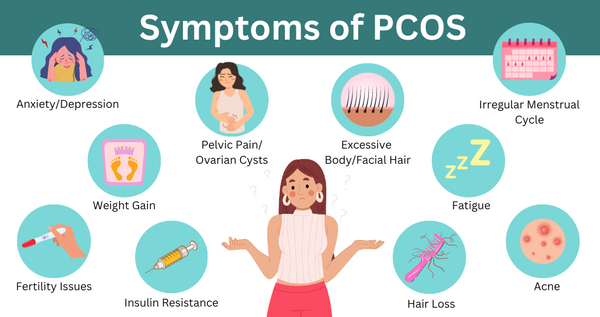The Top 10 PCOS Supplements: The Cysterhood’s Guide to Managing Symptoms

Polycystic Ovary Syndrome (PCOS) is a complicated hormonal condition that affects 1 in 4 women. This fairly common hormonal imbalance results in small cysts on the ovaries and high levels of androgens that result in the inability to ovulate. In addition to menstruation and fertility challenges, PCOS comes with an annoying list of symptoms that many women deal with for the rest of their lives.
While there’s no cure for PCOS, a combination of lifestyle changes, medical interventions, and natural supplements can help manage symptoms and improve quality of life.
How Does PCOS Affect Daily Life?
Some women notice symptoms of PCOS during puberty, while others don’t recognize that anything is wrong until they have unexpected weight gain or have trouble getting pregnant. PCOS brings along a spectrum of symptoms that can include:
- Hair loss
- Weight gain
- Acne
- Fatigue
- Pelvic Pain
- Excess facial hair
- Insulin resistance
- Irregular periods
- Infertility
- Anxiety
- Depression

These symptoms not only affect physical health but emotional well-being too. Some women with PCOS are at risk for developing more serious health conditions such as diabetes, heart disease, high blood pressure, sleep apnea, and stroke. Maintaining a healthy weight is the first step in mitigating the risk of chronic health concerns. Tackling PCOS head-on with a healthy diet and lifestyle may positively impact the symptoms and severity of PCOS.
Top 10 Supplements to Support PCOS
Many women with PCOS have specific vitamin and mineral deficiencies, contributing to the severity of symptoms and impacting fertility. Incorporating the right mix of supplements, alongside a healthy lifestyle, can significantly improve these symptoms and support overall well-being. Here are the top supplements to consider for anyone looking to manage PCOS more effectively:
Vitamin D
Studies show that 85% of women with PCOS have low levels of Vitamin D. Supplementing with Vitamin D3 may support menstrual regularity, fertility, improved mood, and reduced depression.
Omega 3 Fatty Acids
Omega 3s have powerful anti-inflammatory properties and are a healthy addition to any diet. But for women with PCOS, Omega 3 supplements may help combat insulin resistance, support healthy cholesterol levels, promote healthy levels of testosterone, and support menstrual cycle regulation.
CoQ10
Coenzyme Q10 is a naturally occurring antioxidant found in the body. Supplementing with Coenzyme Q10 has been shown to support healthy blood sugar and cholesterol levels. It has also been shown to work well with fertility medications, promoting a greater chance of pregnancy.
B Complex
The B vitamins, especially B12 and folate, support symptoms of PCOS. For starters, they support the body’s fight against insulin resistance. Many B vitamins also support the production of serotonin and dopamine, essential for mood regulation and positive feelings.
Curcumin
Curcumin is a compound found in turmeric that carries many healing benefits. For women with PCOS, curcumin extract may promote ovulation, reduced androgen hormones like testosterone, and improved blood sugar levels.
Magnesium
Magnesium deficiency is common in PCOS. This mineral is key for managing anxiety, blood pressure, and insulin sensitivity. Sufficient magnesium can also promote reduced risk of developing type 2 diabetes – a common risk for women with PCOS. Magnesium Glycinate, in particular, is recommended for its high absorption rate and gentle effect on the stomach.
Zinc
Women with PCOS often have low levels of Zinc. Zinc positively impacts insulin resistance, hormone metabolism, and ovarian health. Its supplementation could support ovulation, promote relief from acne and hair loss, promote reduced inflammation, and protect the body from chronic conditions like heart disease and diabetes.
Probiotics
Research shows that taking probiotics for PCOS may promote hormonal balance, reduced inflammation, and improved cholesterol levels. Improving gut health with Probiotics supplements may also support weight loss, lower BMI (body mass index), improved insulin levels, and enhanced insulin sensitivity, all of which support healthy pregnancies.
Maca Root
Maca is an adaptogenic herb with many health benefits. Maca root may promote reduced hallmark symptoms of PCOS, such as irregular periods, acne, and unwanted hair growth. Maca root is also shown to support insulin sensitivity while naturally boosting energy and mood.
Ashwagandha
Known for its stress-reducing effects, Ashwagandha may also promote hormonal balance and support ovulation and fertility. Ashwagandha supplements may also regulate blood sugar and cortisol levels. Many women with symptoms of PCOS experience higher-than-normal levels of cortisol which can exacerbate symptoms.
Remember, while these supplements might sound like a magic fix, it's always best to chat with a healthcare professional before starting any new supplement regimen. It is also important to include a healthy exercise regimen and a healthy diet, high in fiber and lean proteins, while low in refined carbohydrates and sugar. Your body is unique, and what works for one person might not work for another. Here's to taking control of your PCOS and living your best life, one supplement at a time!
Your Hispanic American Health Store
Health Hispanica® is a Hispanic-American health store specializing in supplements from Hispanic-American-owned brands such as Natura-Genics® and Yerba Farma®. We strive to provide quality and innovative supplements at fair prices and educate our clients and community on healthy living.
The statements above have not been evaluated by the Food and Drug Administration (FDA). This product is not intended to diagnose, treat, cure, or prevent any disease.
Credits
Photo: © champpixs via Canva.com



Leave a comment